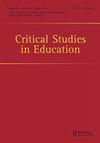恢复信任?瑞典大学关于后真相危机的公共传播
IF 2.7
2区 教育学
Q1 EDUCATION & EDUCATIONAL RESEARCH
引用次数: 0
摘要
本文章由计算机程序翻译,如有差异,请以英文原文为准。
Restoring trust? Public communication from Swedish Universities about the post-truth crisis
ABSTRACT In this paper, we engage with five Swedish universities’ discursive articulation of, and responses to, an alleged post-truth crisis in communication, aimed at the public. Taking discourse theory as our point of departure, the aim is to analyse how universities are trying to maintain or restore trustworthiness against a backdrop of problems with fact resistance, fake news, and mistrust in academic institutions. The dilemma for universities is how to counteract post-truth without falling into the trap of returning to a realist paradigm, with its strict notions of truth and objectivity. The paper shows how public events are characterised by a crisis rhetoric, a dislocation, together with imaginaries of both external and internal threats of disorder, which convey a narrow and simplified understanding of scientific knowledge as objective and neutral. ‘Defenders of truth’ seem to foreclose any discussion by deeming knowledge relativism an irrational and dangerous position that fuels arguments claiming a truth crisis. A conclusion is that universities risk increasing polarisation, rather than trying to tackle problems of trustworthiness. The authors argue that, instead, universities need to be attentive to matters of democracy, power, and privilege, as well as a plurality of epistemological ideals, when discussing the so-called post-truth crisis.
求助全文
通过发布文献求助,成功后即可免费获取论文全文。
去求助
来源期刊

Critical Studies in Education
EDUCATION & EDUCATIONAL RESEARCH-
CiteScore
10.10
自引率
5.10%
发文量
18
期刊介绍:
Critical Studies in Education is one of the few international journals devoted to a critical sociology of education, although it welcomes submissions with a critical stance that draw on other disciplines (e.g. philosophy, social geography, history) in order to understand ''the social''. Two interests frame the journal’s critical approach to research: (1) who benefits (and who does not) from current and historical social arrangements in education and, (2) from the standpoint of the least advantaged, what can be done about inequitable arrangements. Informed by this approach, articles published in the journal draw on post-structural, feminist, postcolonial and other critical orientations to critique education systems and to identify alternatives for education policy, practice and research.
 求助内容:
求助内容: 应助结果提醒方式:
应助结果提醒方式:


